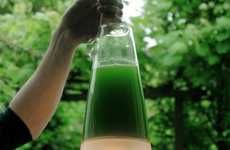
Keerthi Venkataramanan Uncovers a Brilliant Way To Recycle Biofuel Byproducts
References: cleantechnica
One downside to the production of biofuel is that it produces a troublesome amount of crude glycerol (about 100,000 gallons per million gallons of biodiesel), but a young scientist named Keerthi Venkataramanan has found a way to mitigate that problem.
Keerthi Venkataramanan has found that a type of bacteria known as Clostidium Pasteurianum actually eats crude glycerol and produces acids that can be used to create three different types of alcohol-based fuel (butanol, propanediol, and ethanol) in the process. The discovery is an amazing one and could drastically improve the sustainability of biofuel manufacturing. Keep up the good work Keerthi!
Keerthi Venkataramanan has found that a type of bacteria known as Clostidium Pasteurianum actually eats crude glycerol and produces acids that can be used to create three different types of alcohol-based fuel (butanol, propanediol, and ethanol) in the process. The discovery is an amazing one and could drastically improve the sustainability of biofuel manufacturing. Keep up the good work Keerthi!
Trend Themes
1. Biofuel Sustainability - The discovery of bacteria that can convert biofuel byproducts into renewable fuels opens up opportunities for more sustainable biofuel manufacturing.
2. Glycerol Upcycling - The process of converting crude glycerol into valuable fuels through bacterial consumption presents possibilities for reducing waste and maximizing resource utilization.
3. Alcohol-based Alternative Fuels - The production of different types of alcohol-based fuels from crude glycerol using bacteria offers potential for finding alternative fuel solutions.
Industry Implications
1. Biofuel Production - The biofuel production industry can explore incorporating bacteria-mediated glycerol upcycling techniques to improve efficiency and reduce environmental impact.
2. Renewable Energy - The renewable energy industry can benefit from the development of sustainable biofuel manufacturing methods using bacteria to convert biofuel byproducts into usable fuels.
3. Waste Management - The waste management industry can explore opportunities for glycerol upcycling through effective bioremediation solutions with bacteria, contributing to a more circular economy.
0.6
Score
Popularity
Activity
Freshness























